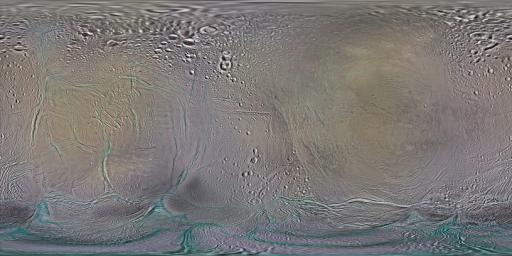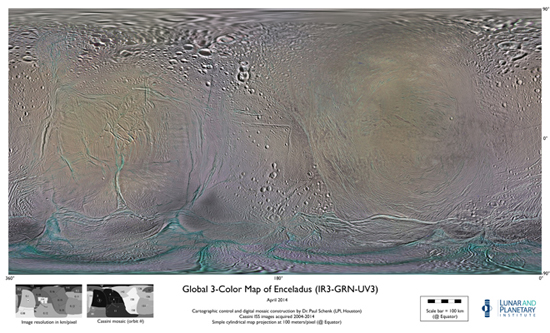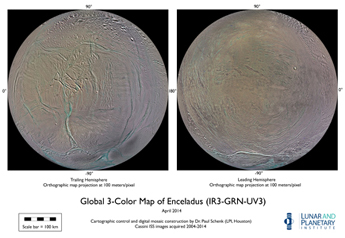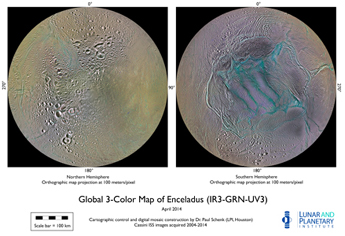
|
Color Maps of Enceladus - 2014
- Click the image above for a larger view
- Full-Res JPEG (15960 x 7980) (18.9 MB)
- Full-Res TIFF (15960 x 7980) (382.1 MB)
Caption:
|
|
This set of global, color mosaics of Saturn's moon Enceladus was produced from images taken by NASA's Cassini spacecraft during its first ten years exploring the Saturn system. These are the first global color maps of these moons produced from the Cassini data.
The yellowish and magenta tones in the map are believed to be due to differences in the thickness of surface deposits there. In addition, many of the most recently formed fractures on Enceladus have a stronger ultraviolet signature (meaning they are brighter), and they appear bluish in these maps. The famous "tiger stripe" fractures, which are the sources of the plumes venting gas and dust into space have a similar color. Researchers think this color could be due to large-grained ice exposed on the surface. Other subtle color markings are related to the moon's local and regional geologic history.
The colors shown in these global mosaics are enhanced, or broader, relative to human vision, extending into the ultraviolet and infrared range.
Resolution on Enceladus in the maps is 100 meters per pixel.
Image selection, radiometric calibration, geographic registration and photometric correction, as well as mosaic selection and assembly were performed by Paul Schenk at the Lunar and Planetary Institute. Original image planning and targeting for Saturn's icy moons were performed by Tilman Denk (Frei Universitat, Berlin) and Paul Helfenstein (Cornell University, Ithaca, New York).
Background Info:
The Cassini-Huygens mission is a cooperative project of NASA, the European Space Agency and the Italian Space Agency. NASA's Jet Propulsion Laboratory, a division of the California Institute of Technology in Pasadena, manages the mission for NASA's Science Mission Directorate, Washington. The Cassini orbiter and its two onboard cameras were designed, developed and assembled at JPL. The imaging operations center is based at the Space Science Institute in Boulder, Colo.
For more information about the Cassini-Huygens mission visit http://saturn.jpl.nasa.gov and http://www.nasa.gov/cassini . The Cassini imaging team homepage is at http://ciclops.org .
Cataloging Keywords:
| Name | Value | Additional Values |
|---|---|---|
| Target | Enceladus | Saturn |
| System | Saturn | |
| Target Type | Satellite | Planet |
| Mission | Cassini-Huygens | |
| Instrument Host | Cassini Orbiter | |
| Host Type | Orbiter | |
| Instrument | Imaging Science Subsystem (ISS) | |
| Detector | ||
| Extra Keywords | Color, Dust, Infrared, Map, Plume, Ultraviolet | |
| Acquisition Date | ||
| Release Date | 2014-11-04 | |
| Date in Caption | ||
| Image Credit | NASA/JPL-Caltech/Space Science Institute/Lunar and Planetary Institute | |
| Source | photojournal.jpl.nasa.gov/catalog/PIA18435 | |
| Identifier | PIA18435 | |



